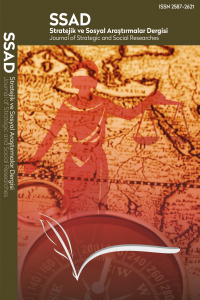AB Genişleme Sürecinde Türkiye’nin Olası Etkileri ve Potansiyel Faydaları
AB’nin genişlemesi, Avrupa değerlerinin sınırlarını genişletmek ve tüm kıtanın menfaati için istikrar ve güvenliği sağlamayı amaçlayan bir araçtır. Öte yandan Türkiye, üye olmak adına AB’nin genişleme sürecinde önemli adımlar attı. Fakat tam üyeliğe ulaşmak, birçok kendine özgü sınırlar ve çeşitli argümanlardan dolayı başarısız olarak kalmaktadır. Bu çalışmanın amacı, Türkiye’nin üyeliğine karşı argümanları iyi bir şekilde anlamak ve Türkiyenin Ab üyesi olmasının AB için ne kadar iyi fırsat olduğunu soruları yanıtlayarak göstermektir. Bu araştırmanın bulgularına dayanarak, Türkiye’nin AB üyeliğini kabul edilmesi halinde AB’nin sosyal, güçlü ekonomik, siyasi ve güvenlik açısından fayda sağlayabileceği sonucuna varılmıştır.
Anahtar Kelimeler:
AB’nin Genişlemesi, Türkiye’nin AB Üyeliği, Türkiye’nin Rolü, AB’ye Katılım İkilemi, İslamofobi
Possible Impacts and Potential Benefits from Turkey in the EU’s Enlargement Process
EU’s enlargement is a tool for extending the borders of European values and aiming to consolidating stability and security for the benefit of all across the continent. Turkey, on the other hand, has made significant steps to become a member in the EU’s enlargement process. However, reaching for a full member are remain unsuccessful, due to many self-limited dimensions and various arguments. The purposes of this study was to develop understanding of the arguments against Turkey’s membership and trying to answer questions, how enlargement to Turkey’s EU member is a great opportunity for the EU. This investigation focuses on various empirical studies which will analyze whether is it valid to agree that Turkey could be an asset. Based on the findings of this investigation, it was concluded that the EU may benefit if it accepts Turkey’s EU membership on social, strong economic, political and security matters.
Keywords:
EU’s enlargement, Turkey’s EU membership, Role of Turkey, Dilemma of EU Accession, Islamophobia,
___
- Books and Articles
- Akkoc, Raziye., ( 2015), “EU attacks Turkey’s backsliding on rule of law, human rights and freedom of expression,” Telegraph Media Group.
- Alesina, Alberto and Waczairg, Romain., (1991) “Is Europe going too far?” Carnegie-Rochester Conference Series on Public Policy, 51: 1- 42.
- Andrew, Moravcsik., (1998), “The Choice for Europe. Social Purpose and State Power from Messina to Maastricht”,Ithaca, New Jersey: Cornell University Press.
- Aydın, S., (2002), “Possible Contributions of Turkey’s EU Membership to the Union,” Volume22, Number 3, Center for Strategic Studies.
- Brou, Daniel and Ruta, Michele, (2007), “Economic integration, political integration or both?”, Columbia University, European University Institute.
- Commission of the European Communities, “Issues Arising from Turkey's Membership Perspective,” Commission Staff Working Document, Brussel.
- David, A Davies., “Friends At the Gate: Why Turkey Matters in U.S. and European Security,” Newport, Rhode Island, The United States Naval War College, 3.
- Elver, H., (2005), “Reluctant partners: Turkey and the European Union,” Middle East Report, Vol. 235, Summer 2005
- Embassy of the Republic of Turkey, (2007), “Turkey and EU”, Washington, DC.
- Emerson, Michael and Tocci, Nathalie.,(2004), “Turkey as a Bridgehead and Spearhead: Integrating EU and Turkish Foreign Policy. CEPS EU-Turkey” Working Papers No.1
- Enrico, Spolaore, (2013), “What Is European Integration Really About? A Political Guide for Economists,” Journal of Economic Perspectives, American Economic Association, vol. 27(3), pages 125-44, Summer.
- Fabio, Wasserfalle., (2013), “Political and Economic Integration in the EU: The Case of Failed Tax Harmonization,” Journal of Common Market Studies.
- Gerd, N., (2005), “Analyzing Middle East Foreign Policies and the Relationship with Europe”, p.204, Routledge Publisher, London.
- Joost, Lagendijk., ( 2016), “Moving Closer to a Reset ─ Turkey and the EU in 2017,” Heinrich Böll Foundation, European Union.
- Meltem, Müftüler, Baç¸ & Deniz Başkan., (2011), “The Future of Energy Security for Europe: Turkey’s Role as an Energy Corridor,”Middle Eastern Studies, Vol. 47, No. 2, 361–378.
- Peterson, John and Bomber, Elizabeth., (1997)“Rationality, structure and power in EU governance: a process dominant approach,” ,Conference of the European Community Studies Association Center, Seattle.
- Sedat, Laçiner, Mehmet Özcan and İhsan Bal., (2005), “The European Union With Turkey: Possible Impact of Turkey’s Membership in The European Union,” International Strategic Research Organization, Ankara.
- Sinan, Ülgen., (2008), “The Evolving EU, NATO and Turkey Relationship: Implications for Transatlantic Security,” Centre for Economics and Foreign Policy Studies.
- Uğur, (1995), “Freedom of Movement vs. Exclusion: A Reinterpretation of the ‘Insider’- ‘Outsider’ Divide in the European Union,” International Migration Analysis Vol 29 No 4: 64.
- World Economic Forum, (2006), “World Economic Forum in Turkey, Connecting Regions Creating New Opportunities,” İstanbul, Turkey.
- Yükleyen A., (2009), “Compatibility of “Islam” and “Europe”: Turkey’s EU Accession,” Vol. 11, No. 1, 2009, pp. 115-13. , Insight Turkey.
- Web Resources Avrupa Times, (2016), “EU temporarily freeze accession negotiations with Turkey”, viewed 31 March 2017, from https://www.avrupatimes.com/world/8769-eu-temporarily-freeze-accession-negotiations-with-turkey.html
- BBC, (2010), “Cameron anger at slow pace of Turkish EU negotiations”, viewed 27 March 2017, from http://www.bbc.com/news/uk-politics-10767768.
- Cyprus Mail, (2017), “Our View: Time for a dramatic final act in the Cyprob saga”, viewed 5 April 2017, from http://cyprus-mail.com/2017/03/26/view-time-dramatic-final-act-cyprob-saga/
- Daily Sabah, (2017), “Turkey’s unemployment rate hits 7-year-high,” Viewed March 21, 2017, fromhttps://www.dailysabah.com/economy/2017/03/15/turkeys-unemployment-rate-hits-7-year-high-at-127-pct-in-december.
- European Commission, “‘The Euro MediterraneanPartnership,” viewed 30 March 2017, from http://ec.europa.eu/external_relations/euromed/index_en.htm
- European Commission, “The Policy: What is the European Neighborhood Policy,” viewed 10 February 2017, from http://ec.europa.eu/world/enp/policy_en.htm
- European Council on Foreign Relations, (2015), “Rule of law, democracy, and human rights in Turkey,” viewed 30 March 2017 from http://www.ecfr.eu/scorecard/2015/wider/3
- Hagopian, Harry., (2005), “ EU-Turkey & the Armenian Genocide,” viewed 28 March 2017, from http://www.crag.org.uk/articles/article24.html
- Heinz, Kramer., (2006), “Turkey and the EU: The EU’s Perspective,”Insight Turkey 8, no., viewed 26 February 2017, from www.swp-berlin.org/en/common/get_document.php?asset_id=3789
- Jordan, Schachtel., (2015), “EU Is an ‘Islamophobic Christian Club’ If They Refuse Us Entry: Turkish Pres Erdogan,” viewed 8 Mach 2017, from http://www.breitbart.com/national-security/2015/01/26/eu-is-an-islamophobic-christian-club-if-they-refuse-us-entry-turkish-pres-erdogan/
- Reuters, (2017), “Merkel: Worth doing all we can to improve German-Turkish”, viewed 10 January 2017, from http://www.reuters.com/article/turkey-referendum-merkel-idUSB4N1DI013
- Statistics, (2017), “Minimum wage statistics”, viewed 22 March 2017, from http://ec.europa.eu/eurostat/statistics-explained/index.php/Minimum_wage_statist
- Trading Economics, (2017), “Turkey GDP Growth Rate Forecast 2016-2020,” viewed 21 March 2017, from http://www.tradingeconomics.com/turkey/gdp-growth/forecast.
- ISSN: 2587-2621
- Yayın Aralığı: Yılda 3 Sayı
- Başlangıç: 2017
- Yayıncı: Mehmet Ali KARAMAN
